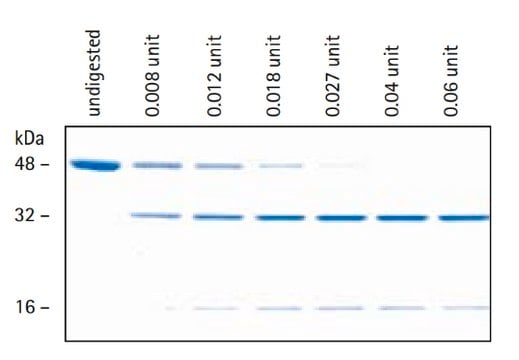17-321
Rap1 Activation Assay Kit
Non-radioactive Rap1 Activation Assay Kit that uses Ral GDS RBD, agarose (Catalog # 14-455) to precipitate Rap1-GTP from cell lysates & detection by a Rap1 specific antibody.
Sign Into View Organizational & Contract Pricing
All Photos(1)
About This Item
UNSPSC Code:
12161503
eCl@ss:
32161000
NACRES:
NA.84
Recommended Products
Quality Level
manufacturer/tradename
Upstate®
technique(s)
activity assay: suitable
affinity binding assay: suitable
NCBI accession no.
UniProt accession no.
shipped in
dry ice
Gene Information
human ... RAP1GDS1(5910)
Packaging
Kit capacity: 20-30 assays
Components
100X GTPγS, 10mM (Cat.# 20-176)
100X GDP, 100mM (Cat.# 20-177)
Rap1 Activation Lysis Buffer, 2X
Anti-Rap1
Rap1 Assay Reagent (Ral GDS-RBD, agarose) (Cat.# 14-455)
100X GDP, 100mM (Cat.# 20-177)
Rap1 Activation Lysis Buffer, 2X
Anti-Rap1
Rap1 Assay Reagent (Ral GDS-RBD, agarose) (Cat.# 14-455)
Quality
Routinely evaluated by affinity precipitation assay. Ral GDS RBD, agarose precipitated GTP-Rap1 from HEK293 lysates. The precipitated GTP-Rap1 was detected by immunoblot analysis using Anti-Rap1.
Legal Information
UPSTATE is a registered trademark of Merck KGaA, Darmstadt, Germany
Disclaimer
Unless otherwise stated in our catalog or other company documentation accompanying the product(s), our products are intended for research use only and are not to be used for any other purpose, which includes but is not limited to, unauthorized commercial uses, in vitro diagnostic uses, ex vivo or in vivo therapeutic uses or any type of consumption or application to humans or animals.
Signal Word
Warning
Hazard Statements
Precautionary Statements
Hazard Classifications
Eye Irrit. 2
Storage Class Code
10 - Combustible liquids
Certificates of Analysis (COA)
Search for Certificates of Analysis (COA) by entering the products Lot/Batch Number. Lot and Batch Numbers can be found on a product’s label following the words ‘Lot’ or ‘Batch’.
Already Own This Product?
Find documentation for the products that you have recently purchased in the Document Library.
Uma Potla et al.
The Journal of clinical investigation, 124(4), 1757-1769 (2014-03-20)
Injury to the specialized epithelial cells of the glomerulus (podocytes) underlies the pathogenesis of all forms of proteinuric kidney disease; however, the specific genetic changes that mediate podocyte dysfunction after injury are not fully understood. Here, we performed a large-scale
Emilie Montenont et al.
Blood advances, 5(9), 2362-2374 (2021-05-05)
Human anucleate platelets cannot be directly modified using traditional genetic approaches. Instead, studies of platelet gene function depend on alternative models. Megakaryocytes (the nucleated precursor to platelets) are the nearest cell to platelets in origin, structure, and function. However, achieving
B Franke et al.
The EMBO journal, 16(2), 252-259 (1997-01-15)
Rap1 is a small, Ras-like GTPase whose function and regulation are still largely unknown. We have developed a novel assay to monitor the active, GTP-bound form of Rap1 based on the differential affinity of Rap1GTP and Rap1GDP for the Rap
Rasmus Koefoed Petersen et al.
Molecular and cellular biology, 28(11), 3804-3816 (2008-04-09)
Cyclic AMP (cAMP)-dependent processes are pivotal during the early stages of adipocyte differentiation. We show that exchange protein directly activated by cAMP (Epac), which functions as a guanine nucleotide exchange factor for the Ras-like GTPases Rap1 and Rap2, was required
Xi Su et al.
Cell death & disease, 13(3), 218-218 (2022-03-11)
Thyroid cancer (TC) is one of the most common malignancies involving the head and neck, and its incidences are increasing every year. Small G protein signaling modulators 2 (SGSM2) belongs to a newly identified protein group that contributes to numerous
Our team of scientists has experience in all areas of research including Life Science, Material Science, Chemical Synthesis, Chromatography, Analytical and many others.
Contact Technical Service






